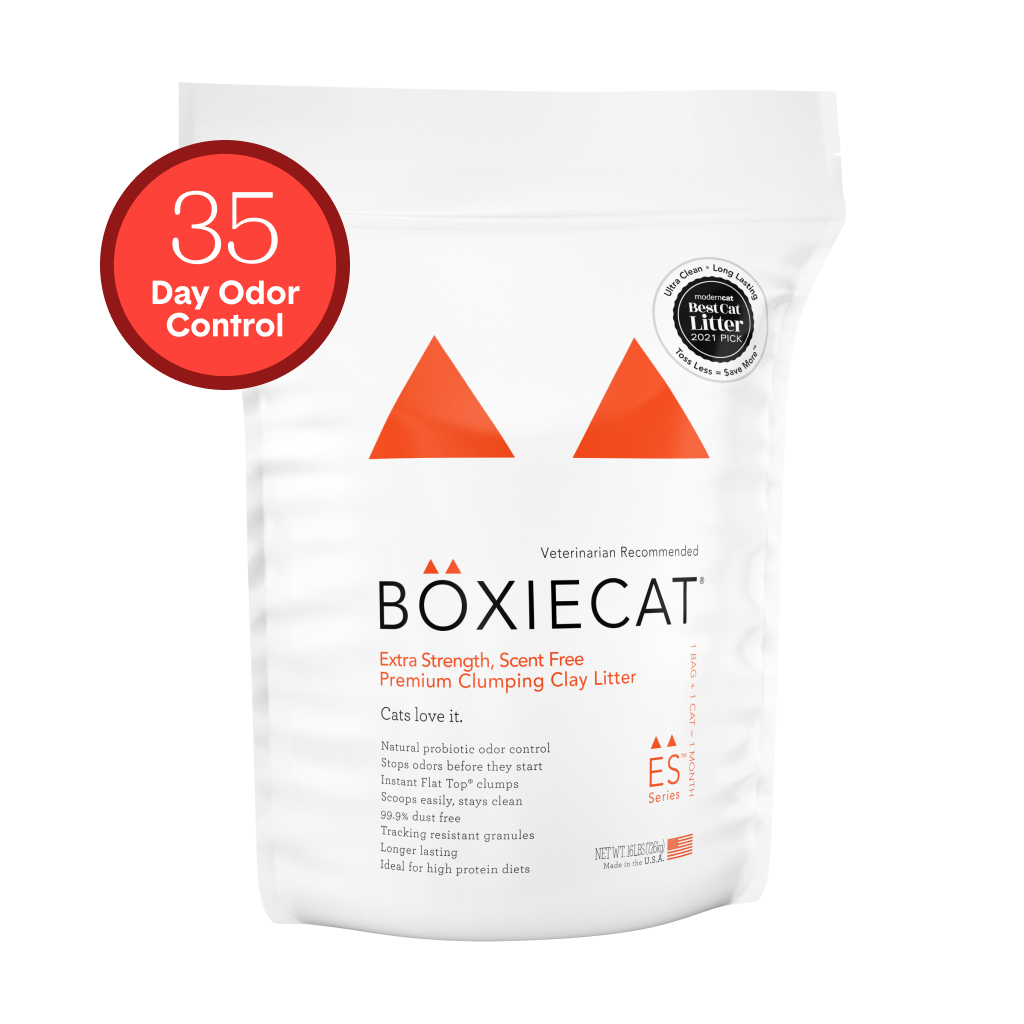How Often Cat Litter Really Needs Changing (Most People Get This Wrong)

If you’ve ever walked past your cat’s litter box and gagged a little, you're not imagining it.
That smell means it’s time.
But the real question is: how often should you change cat litter to keep your cat happy and your home from smelling like a gas station bathroom?
It’s not just about odor.
It’s about your cat’s health, their behavior, and keeping your living space livable.
Here’s everything you need to know—without the fluff.
Key Takeaways
-
Change litter regularly to avoid ammonia buildup and odor.
-
How often depends on litter type, number of cats, and box size.
-
Daily scooping keeps things fresh in between full changes.
-
Clumping clay needs replacing every 1–2 weeks. Crystal can last up to 3–4 weeks.
-
Boxiecat’s unscented litter is designed to last longer, even with multiple cats.
Why Changing Litter Matters More Than You Think
Old litter doesn’t just stink.
It builds up bacteria.
It irritates your cat’s nose.
And worse—it makes them avoid the box entirely.
Ammonia fumes from old pee can actually cause respiratory issues for both you and your cat.
Not to mention, dirty litter becomes a breeding ground for parasites and mold—especially in warm weather.
A fresh box = a healthy cat.
Every time.
So, How Often Should You Change It?
Let’s break it down by litter type, because not all litter works the same.
How Often to Change Cat Litter by Type
|
Litter Type |
Scooping |
Full Change |
|
Clumping Clay |
Daily |
Every 1–2 weeks |
|
Non-Clumping Clay |
Daily |
Every 2–3 days |
|
Silica Gel (Crystal) |
Daily |
Every 3–4 weeks |
|
Paper or Wood Pellets |
Daily |
Weekly |
|
Plant-Based (Corn, Wheat, etc.) |
Daily |
Every 5–10 days |
Some cats are more tolerant than others, but don’t push your luck.
If you notice your cat sniffing the box and walking away, you’ve already waited too long.
What Affects How Often You Should Change the Litter?
There’s no one-size-fits-all answer, because your home isn’t like anyone else’s.
Here’s what changes the schedule:
-
Number of cats
More cats = more waste = faster odor = more frequent changes. -
Size of the litter box
Smaller boxes fill up faster. Duh. But it’s often overlooked. -
Litter quality
Cheap litter gets gross faster. Better brands like Boxiecat last longer because they clump tighter and trap odor better. -
Airflow in your home
Ventilated areas slow down odor buildup. Tight closets? Not so much. -
Your cat’s habits
Some cats are messy diggers. Some go like clockwork. Others hold it until your Zoom meeting starts.
Need a litter that holds up in a busy multi-cat home?
Try Boxiecat’s extra-strength formula designed to control odor and clump tight—even with multiple users.

The Right Way to Change Cat Litter
Here’s the part everyone skips.
Changing litter isn’t just dump and go.
It’s a process, especially if you want to keep smells down and avoid bacteria.
Here’s the proper method:
-
Put on gloves. Trust us.
-
Dump used litter into a sealed trash bag (double-bag if needed).
-
Scrub the litter box with warm water and mild, fragrance-free soap.
-
Dry it completely before adding new litter. No shortcuts.
-
Refill with fresh litter—about 2–3 inches deep, or per your litter brand’s suggestion.
5 Signs It’s Time to Change the Litter Now
-
You catch a strong ammonia smell when you walk by.
-
Your cat suddenly pees outside the box.
-
The litter feels soggy or breaks apart when you scoop.
-
Clumps start sticking to the box instead of coming out clean.
-
You’re using scented candles… next to the litter box.
If you're masking the smell instead of solving it, it’s overdue.
3 Ways to Make Litter Last Longer (Without Getting Gross)
-
Scoop every single day
Even twice a day if you have multiple cats. It’s the #1 way to delay a full change. -
Use high-performance litter
Boxiecat’s Unscented Clumping Litter is low-dust, odor-fighting, and lasts longer between changes. -
Use a litter mat
Less tracking = less waste = fewer top-offs.
What Happens If You Don’t Change Litter Often Enough?
You may not notice the smell right away—but your cat does.
Old litter causes:
-
Box rejection
-
Respiratory issues
-
Urinating outside the box
-
Unwanted behavior like spraying
Over time, your cat may form a permanent habit of going anywhere but the box.
That’s a problem you don’t want.
Final Thoughts
The rule is simple:
Scoop daily. Change weekly. Adjust as needed.
It’s not just about being clean—it’s about respecting your cat’s space.
Clean litter keeps your cat using the box like they should, keeps your home smelling like a home, and keeps you from doing damage control at 2am.
Make it easier on yourself with a litter that holds up—like Boxiecat’s Unscented Plant-Based Litter.
It’s low-dust, odor-locking, and soft on paws.
When the box stays fresh, your cat stays happy.
And everyone wins.
- Tags: Cleaning Litter Boxes

